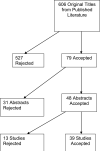Meta-analysis: do irritable bowel syndrome symptoms vary between men and women?
- PMID: 20662786
- PMCID: PMC2932820
- DOI: 10.1111/j.1365-2036.2010.04409.x
Meta-analysis: do irritable bowel syndrome symptoms vary between men and women?
Abstract
Background: Studies suggest that sex and gender-related differences exist in irritable bowel syndrome (IBS), but data is often conflicting.
Aim: To evaluate gender differences and the effect of menstrual cycle and menopausal status on IBS symptoms.
Methods: We performed a systematic review of MEDLINE to search for studies comparing IBS symptoms between gender, menstrual cycle phases and menopausal states in IBS and/or healthy individuals. We performed meta-analyses to compare the relative risk (RR) of individual IBS symptoms between men and women.
Results: Twenty-two studies measured gender differences in IBS symptoms. Women were more likely to report abdominal pain (RR = 1.12, 95% CI: 1.02, 1.22) and constipation-related symptoms (RR = 1.12, 95% CI: 1.02, 1.23) than men (all P < 0.05). However, men with IBS were more likely to report diarrhoea-related symptoms than women with IBS (RR = 0.84, 95% CI: 0.75, 0.94, P < 0.05). A systematic review of 13 studies demonstrated that both IBS and healthy women reported increased IBS symptoms during menses vs. other phases. There were insufficient data to determine the effect of menopause and hormone supplementation on IBS symptoms.
Conclusions: In the general and IBS populations, gender differences in IBS symptoms exist, although these differences are modest. Studies suggest that female sex hormones influence the severity of IBS symptoms, but more studies are needed.
2010 Blackwell Publishing Ltd.
Figures




References
-
- Drossman DA. The functional gastrointestinal disorders and the Rome III process. Gastroenterology. 2006;130:1377–1390. - PubMed
-
- Kang JY. Systematic review: the influence of geography and ethnicity in irritable bowel syndrome. Aliment Pharmacol Ther. 2005;21:663–76. - PubMed
-
- Camilleri M, Choi MG. Review article: Irritable bowel syndrome. Alimentary Pharmacology and Therapeutics. 1997;11:3–15. - PubMed
-
- Talley NJ. Irritable bowel syndrome: definition, diagnosis and epidemiology. Baillieres Best Pract Res Clin Gastroenterol. 1999;13:371–84. - PubMed
Publication types
MeSH terms
Grants and funding
LinkOut - more resources
Full Text Sources
Medical
